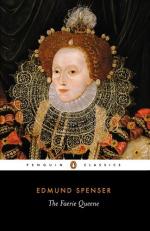II. The Allegory: When the Christian Soldier is attacked by Joylessness, he has a far more desperate struggle than that with Infidelity, and comes out wounded though victorious. Joylessness when crushed by Holiness is restored by Pagan Philosophy. The backsliding Christian is warned in time by Prudence of the fearful consequences of sin, and hastens to turn his back on Pride and the other sins. The soul is led to dread Pride, not by Truth, but by its sufferings and other inferior motives.
25. THEIR TIMELY VOYCES, their voices keeping time with their harps.
27. OLD LOVES, famous love-affairs, the subject of the Minnesaengers.
29. IN WOVEN MAILE, in chain armor.
32. ARABY, probably here the Orient in general.
33. FROM FURTHEST YND, from farthest India.
39. UNTO A PALED GREENE, a green inclosure (lists for a tournament) surrounded by a palisade.
44. HIS. An old method of forming the possessive, based on a misapprehension of the original Anglo-Saxon suffix _-es_, which was shortened in middle English to _-is_, and finally to s.
45. BOTH THOSE, etc. Both Duessa and the shield are to go to the victor.
65. A GRYFON, a fabulous animal, part lion and part eagle. Gryfon is subject of encountereth with Dragon as object.
89. AND SLUGGISH GERMAN, etc., and sluggish brother dost relax thy strength to send his (Sansfoy’s) foe after him, that he may overtake him. In ll. 86-88 Sansjoy addresses his brother, in ll. 89-90 himself. German is any blood relation.
100. The Knight supposed that Duessa’s encouraging words were addressed to him.
114. Spenser here, with fine dramatic effect, imitates Homer, who saves Paris and Aeneas by a similar device. Iliad, iii, 380, and v, 345.
159. TEARES. This mention of the man-eating crocodile’s tears is based on an old Latin proverb. Sir John Mandeville repeats the story.
172. GRIESLY NIGHT. According to mythology (Hesiod’s Theog., 123), one of the first things created, the daughter of Chaos, and mother of Aether (sky) and Hemera (day); also of Deceit, Strife, Old Age, and Vengeance. See xxii and xxvii.
202. ON GRONING BEARE, on a bier with groaning friends around.
204. O WHAT OF GODS, etc., O what is it to be born of gods, if old Aveugle’s (the father of the three Saracens) sons are so ill treated.
219. AND GOOD SUCCESSES, etc., and good results which follow their foes.
221. OR BREAKE THE CHAYNE, refers to Jove’s proposition to fasten a golden chain to the earth by which to test his strength. Homer’s Iliad, viii, 19. Cf. Milton’s Paradise Lost, ii, 1051.
225. BAD EXCHEAT, bad gain by exchange. Escheat is an old legal term, meaning any lands or goods which fall to the lord of a fief by forfeiture. Cf. “rob Peter to pay Paul.”




